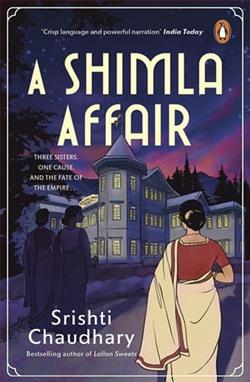
A Shimla Affair
by Srishti Chaudhary
…the future of India may lie in unexpected hands.
1940, Shimla, British India. Nalini Mistry longs for a life outside of the four walls of her home; reality, however, is different.
Nalini and her two older sisters—Noor and Afreen—run the Royal Hotel Shimla, an opulent establishment that serves British high society. But when an underground revolutionary group asks them to aid a murderous conspiracy during the hotel’s Summer Jubilee Ball, they find themselves thrust headfirst into a dangerous game of lies. It doesn’t help that Nalini finds herself falling for Charles Nayler, a British officer; a man who sees her like nobody else.
As the night of the ball approaches, the sisters are drawn into a web of hidden agendas, shifting alliances, and impossible choices—where nothing is what it seems, and the price of freedom may be everything.
A Shimla Affair follows the story of three women attempting to change the course of Indian independence—for love, duty, and revenge.
.
Read
A Shimla Affair on http://kissnovel.net
Martial Peak Reviews
Srishti Chaudhary's A Shimla Affair is a captivating narrative set against the backdrop of 1940s British India, a time when the country was on the cusp of monumental change. The novel intricately weaves themes of love, duty, and rebellion, offering readers a glimpse into a world where personal desires clash with the larger socio-political landscape. Chaudhary's storytelling is both evocative and immersive, drawing readers into the opulent yet tumultuous world of the Royal Hotel Shimla.
At the heart of the story are the Mistry sisters—Nalini, Noor, and Afreen—each of whom is vividly portrayed with distinct personalities and motivations. Nalini, the youngest, is a character that many readers will find relatable. Her longing for a life beyond the confines of her home and her internal struggle between duty and desire form the emotional core of the novel. Her relationship with Charles Nayler, a British officer, adds layers of complexity to her character. Their romance is fraught with tension, given the political climate and their differing backgrounds, yet it is portrayed with sensitivity and depth.
The setting of Shimla, with its lush landscapes and colonial architecture, is brought to life through Chaudhary's descriptive prose. The Royal Hotel Shimla, a symbol of British opulence, serves as a microcosm of the larger political tensions of the time. The hotel's Summer Jubilee Ball becomes a pivotal event in the narrative, a stage where the personal and political intersect in dramatic fashion. The ball is not just a social event but a catalyst for the unfolding conspiracy, highlighting the precarious balance between appearances and reality.
Chaudhary skillfully explores the theme of freedom—both personal and political. The sisters' involvement with an underground revolutionary group underscores the risks and sacrifices involved in the fight for independence. Each sister's journey is marked by a quest for autonomy, whether it be through love, duty, or revenge. Noor and Afreen, while not as prominently featured as Nalini, are integral to the narrative, representing different facets of the struggle for freedom. Noor's pragmatism and Afreen's idealism provide a counterbalance to Nalini's romanticism, creating a dynamic interplay between the sisters.
The novel's exploration of hidden agendas and shifting alliances adds an element of suspense, keeping readers engaged as the plot unfolds. Chaudhary deftly navigates the complexities of loyalty and betrayal, illustrating how the lines between friend and foe can blur in times of conflict. The sisters' involvement in the conspiracy forces them to confront difficult choices, where the stakes are nothing less than life and death. This tension is palpable throughout the novel, culminating in a climax that is both unexpected and poignant.
In terms of character development, Chaudhary excels in creating nuanced and multi-dimensional characters. Nalini's evolution from a sheltered young woman to a determined participant in the independence movement is particularly compelling. Her internal conflicts and growth are portrayed with authenticity, making her a character that resonates with readers. Similarly, Charles Nayler is more than just a romantic interest; his own struggles with identity and duty add depth to his character, making their relationship all the more intriguing.
Comparatively, A Shimla Affair shares thematic similarities with other historical novels set during India's struggle for independence, such as Manreet Sodhi Someshwar's The Radiance of a Thousand Suns or Chitra Banerjee Divakaruni's The Last Queen. However, Chaudhary's focus on the intimate lives of three sisters provides a fresh perspective, emphasizing the personal impact of historical events. The novel's blend of romance, intrigue, and historical detail sets it apart, offering a unique lens through which to view this pivotal period in history.
Overall, A Shimla Affair is a beautifully crafted novel that captures the essence of a transformative era in Indian history. Chaudhary's ability to intertwine personal narratives with historical events results in a story that is both engaging and thought-provoking. The novel's exploration of love, loyalty, and liberation is sure to resonate with readers, making it a memorable addition to the genre of historical fiction. For those interested in stories that delve into the complexities of human relationships against a backdrop of political upheaval, A Shimla Affair is a must-read.
In conclusion, Srishti Chaudhary has delivered a compelling tale that not only entertains but also enlightens, offering insights into the human spirit's resilience and the enduring quest for freedom. A Shimla Affair is a testament to the power of storytelling, reminding us of the timeless nature of love and the indomitable will to change one's destiny.
























Reviews 0
Post a Reviews: